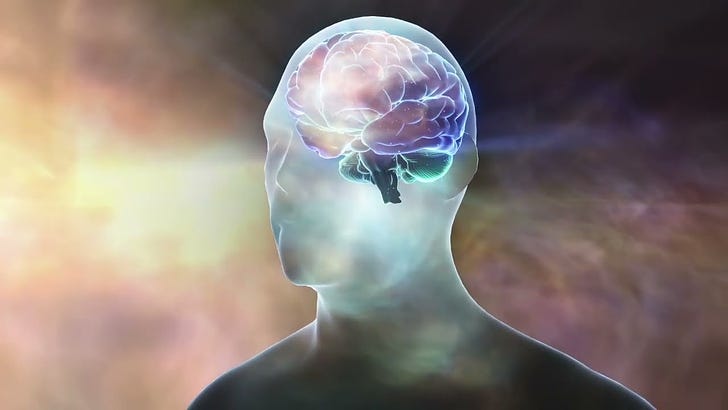“Do not dwell in the past, do not dream of the future; concentrate the mind on the present moment.” - The Buddha.
What excites you more? Trying to understand what is or trying to forecast what might be? Do you enjoy more listening to a good explanation of today or listening to someone’s guess about what tomorrow will be like? At least will be like according to them?
Is it true that understanding what is the case now can enable us to forecast what might be? Many think this is the case: a misconception that comes to us from the physical sciences. There, in the physical sciences like physics and chemistry preeminently we can indeed study what a system is doing now and predict how it will evolve through time - both in the future and rewinding into the past. We can do this because in many situations we can, in that old high school science class way of putting things: control our variables. But what wasn’t mentioned in high school was not just that the variables to be controlled were physical factors like the temperature of your reaction vessel, or the gust of wind against your pendulum or the vibration of the laboratory bench - all of which, yes, might indeed upset your prediction - but something went without saying in those science classes - something that in fact is worth saying after all. Namely that someone - a person - might choose to do something to change the outcome of your prediction. The ball doesn’t land where you predicted it would despite controlling for wind speed and temperature and despite your fancy equations of projectile motion and your precise calculations using a spreadsheet down to the 3rd decimal place precisely because nothing in your analysis, modelling and calculations could ever have accounted for…someone rushing into the picture and catching your ball before it ever hit the ground.
Fair enough, we make predictions assuming that sort of thing never happens and say things like: assuming no person interrupts this experiment then logically this prediction follows and so on. And that’s a reasonable thing to do rather often in physics, chemistry and engineering. Indeed it’s not just reasonable but crucially important for actually doing stuff: creating technologies, finding solutions and even cures to disease and much more besides. But that’s the physical sciences.
What about anything outside of those rather narrow areas? For example can we ever ignore people getting involved and making choices to affect some system under study when the system under study is literally the WORLD and the world as it will evolve over the coming 24 hours or 24 months? Of course we cannot ignore what people might do, what choices they’ll make, what discoveries they’ll stumble over and what innovations they’ll create. We can’t possibly ignore that when speaking about the future. That is an absurdity. Absurd or not though, people do it routinely. The media, books and even scientific literature are filled with such attempts to ignore what people could do by predicting what someone thinks they will do.
In a similar vein, we can make a choice about trying to understand our best explanations as we know them now and attempt to improve on them, or, on the other hand we could concern ourselves with what guesses people have already made and assign degrees of confidence or certainty to them.
Not because we can know that any of them are likely to turn out to be the best explanation but because we want to try to predict which of the as yet unaccepted explanations just might turn out to come out on top. But to what end? We can’t possibly predict that all of the as yet not-any-good explanations won’t be all roundly refuted by the holy grail of progress: the single good explanation yet to be created. And there’s no point trying to make a prediction based on a not-good explanation.
Is the explanation of, for example, the so-called fine tuning problem- namely why do the constants of nature have the values they do or why do the laws of physics have the form they do - is the answer to this mystery that God created everything and so therefore the constants of nature are just as God set them so that life would flourish and presumably so that he would have worshippers in the world? Or is it that all physically possible, or indeed logically possible values for the laws and constants of nature actually exist in some much more vast higher dimensional space and by necessity we must find ourselves in some physical reality somewhere and so here we are (while in most universes no life exists at all because in those places the conditions favour nothing but empty space or something else equally boring)?
Or is it that it will turn out that only one mathematically possible set of laws makes sense logically speaking and so here we MUST find ourselves as a matter of pure necessary truth?
Or is it all a simulation running inside another simulation inside another simulation fractal like and so on?
Or, let’s keep enumerating the guesses that actually no one has any clue whether any are any good or not? Some people as I have said are satisfied with admitting: no one knows. No one has a clue - at least not yet. This is a problem, and not only am I okay with that, I kind of find it exciting that no one knows. Others are not satisfied: they want to assign some kind of likelihood to such guesses about things people do not know. But, again, to what end?
Far too many spend their time regretting the past or worrying about the future. In either case this places them in a negative frame of mind: sorrowful or anxious, possibly fearful. Therefore contemplatives from many traditions over the years have discovered that simply being in the present is curative. What we have as a matter of existence is this present moment: we are conscious of now, not tomorrow or yesterday. Those may exist as a matter of scientific fact and versions of you there in the past and future conscious of those times. But you are not identical to those copies of yourself. You are you always here and now and actually taking the moment to notice the present moment can relieve you of worry about the future because it’s not here and the worst has not happened yet. And the past is as it is - fixed. So there’s no point worrying about that either.
The stoic philosopher Marcus Aurelius wrote in his Meditations to “Never let the future disturb you. You will meet it, if you have to, with the same reason that arms you against the present.”
There are lessons here both individually and civilizationally. I have spent many hours recently unpacking a particular version of worry about the future when it comes to what technology - in particular AI will bring in the coming years. Other times I have talked about those concerned about what the climate will bring in the coming years. Virologists and epidemiolgists, public health experts and more are concerned about what the future of infectious disease will bring. Astronomers are worried about what the skies will bring, geologists about volcanoes, earthquakes and tsunamis. More and better science is needed to understand complex systems in astronomy, biology and climatology (just to mention the abcs) so we humans as a civilisation might prepare best for global challenges. But this is just the point: we will prepare if we learn what is possible for us to do not what must be the case but what might be the case should we not know: not create knowledge and not understand what is to be known about reality now. Again, to underscore this, to prepare at all for disaster we want to understand reality now. To create an explanation now. Obsessing over what might be, what could be, what doom awaits us is not about understanding reality now. Understanding very often is exhilarating - for all the right reasons. It involves creation - creating new explanations. And that allows for progress.
Contrast this with an obsession about what the future will be like or might be like - and it’s less exhilaration from an understanding and more an anxiety laden concern about dangers and the doom that follows.
Those obsessing about what might be and want the impossible to make predictions about the future do not realise that people change the future rather often for the better. But ignoring that they prophesy doom as a consequence. It is understandable both the prophets and the people who listen to them become unreasonably concerned rather than hopeful about the future. And what is caused is social anxiety on a vast scale.
But the fundamental truth about all guesses about the future: whether in terms of a comet rushing towards us, a nearby star becoming unstable, a volcano erupting, the climate gradually changing, AI becoming more advanced, China becoming more militant and so on and on and on - we can all imagine future problems and this can leave many anxious. What we must keep in mind is that this is only because it is that much more difficult to imagine the solutions people will create to those problems. As we always do. For that is what we do: we are people and people are creative problem solvers and we cannot predict ahead of time the solutions people will create to problems they are yet to encounter.
Now none of this is to say worrying is always and everywhere irrational. Nor that we should not prepare for the possibility of terrible outcomes: that is what a military is for at the scale of nations and what a home security system is for at the level of the individual. We people can guess at the future and it’s good we can do so. But it is worthwhile reflecting on when this capacity to imagine leads to suffering. We can imagine worst case scenarios or at least terrible case scenarios. We can always imagine things getting worse. And well, they just might. But if we simultaneously understand that although sometimes predictions are crucial and possible - for example this antibiotic will cure your infection, this rocket fuel will have the necessary thrust, this computer will be able to render the video you want to produce and so on - those scientific predictions - genuine scientific predictions that can account for what a physical system can and indeed will do because we can ignore the choices people might make or the knowledge they might create in a so called “controlled situation” where we understand the factors that come to bear on the outcome - we should be just as ready to acknowledge that while those things are possible scientifically - those predictions are possible, we need move not far at all into a realm where prediction is not possible.
Truly, physically impossible because of a deep truth about this world: namely that we are in it and we are creating knowledge and making choices. So any attempt to predict what the world will be like tomorrow as a whole much less a year from now or 10 years depends on us knowing what knowledge will be created between now and then and that is something we can never do. We do not know who will publish a result or create a widget that revolutionises the world come tomorrow or next year. Or on the negative side who will make the awful choice to commit random violence, start a war or release the virus. Or who will make a breakthrough in AI technology sooner than expected using some architecture never dreamed of before now, or who might create a new way to harness energy from the Earth or determine a way to remove carbon dioxide from the atmosphere efficiently and effectively. All of these very real possibilities mean that any attempt to predict the future by assuming that the knowledge we have now is just the same knowledge we will rely on tomorrow or next year or next decade is an utterly bankrupt project. No one can make such predictions because they are not predictions. They are prophecies: they are guesses about the future utterly uncoupled from the simple fact that people make choices and create knowledge that changes the future in entirely unpredictable ways.
Every common sense person on the street and every child knows we do not know what tomorrow holds. But to know what a year from now will be like in technology, medicine, science and global affairs - that takes a university education. Only a person schooled in extrapolation from existing trends, regression analysis and sophisticated mathematical statistics like Bayesianism can refute reality by claiming not merely to make some prediction, but to make a prediction with some degree of confidence, and at times a confidence they can assign numbers to because of some calculation they claim they have done. That takes an education.
The Buddha taught us to focus on the now and not be fixated on the future. The Stoics from Marcus Aurelius onwards recognised that same truth independently. It is there to be discovered by you too. Not only is it psychologically healthy to refocus ones attention away from possible futures - especially when they’re thought to be dire, or from past regrets or perceived losses - it is also in large part scientifically rational to do so. Because we cannot change the past and the future is genuinely open to us because human creativity exists and it changes the future. But only because of decisions made in the present - by us. Don’t worry about the future that is yet to be. Focus on the now, on your problems now. Learn now. Have fun now. And that way you’ll create the future and have no need to predict it because that, you’ll notice was impossible all along because you just made the future different to what you thought it could have been, or would have been had you not been here and now as you always and only ever are.
Contemplatives, mystics and those who developed skill at introspection over the millennia learned what many modern forecasters have forgotten today: truth is only found in the present moment. The future is unknown and much of the past is lost whether because our memory fades or the physical world erodes away over time. So listen to the forecasters, soothsayers, clairvoyants and futurists if you must. But when your anxiety rises as the avalanche of prophecies overwhelm you with the doom to come, come back to the present moment and enjoy what is rather than regretting what was or fearing what will be.
If you’d like to watch my series all about predicting the future of technology which is a precursor to this piece, go here: https://youtube.com/playlist?list=PLsE51P_yPQCQ79ad7ZGd0cdzUIVTqph50&si=zUTkdXtReP5NMPrm












Share this post